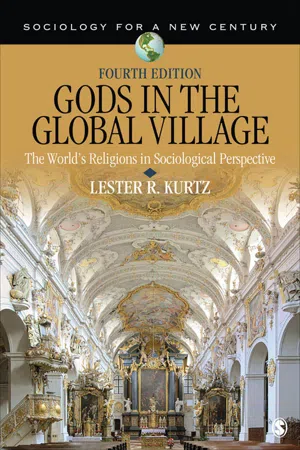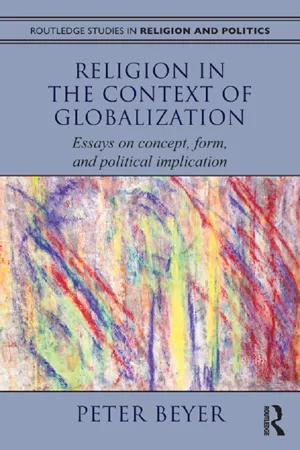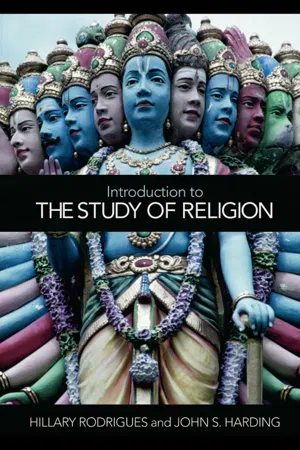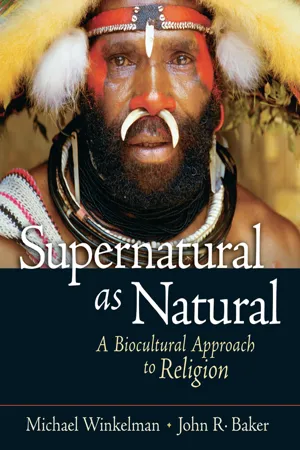Social Sciences
World Religions
World religions refer to the major religious traditions practiced around the world, including Christianity, Islam, Hinduism, Buddhism, and others. These religions often have distinct beliefs, rituals, and ethical codes, and they play a significant role in shaping cultures, societies, and individual worldviews. The study of world religions provides insights into diverse spiritual practices and their impact on human behavior and societies.
Written by Perlego with AI-assistance
Related key terms
9 Key excerpts on "World Religions"
- eBook - ePub
Gods in the Global Village
The World′s Religions in Sociological Perspective
- Lester R. (Ray) Kurtz(Author)
- 2015(Publication Date)
- SAGE Publications, Inc(Publisher)
In this volume, I will weave together elements of the four approaches— (1) subjective, (2) structural, (3) dramaturgical, and (4) institutional—as I analyze the world’s religions, because each identifies a significant element of religious life. The subjective element is important in identifying how individuals are linked with the broader human community through the worldview and ethos options available to them in a diverse social setting. The various beliefs of religious systems are interconnected structurally and tied in patterned ways to each other and to the social system in which they are developed. Sociologists tend to be especially interested in religious institutions as key players in the social world and the ways in which religious ideas are performed on the world stage. An individual Hindu, for example, interprets the world and acts in it according to the cultural patterns provided by his or her social networks and institutions as they collide with the institutions, beliefs, and practices of people from other religious traditions by means of the globalization process.Anyone trying to understand religion in the global village will find in sociology a fruitful analytical framework. It is only fair, however, to warn the reader of some problems with the way sociologists look at religion. Religious traditions are, from a sociological perspective, comprehensible constructions of the human mind, yet they transcend comprehension. They constitute a collective effort to make sense out of life and death but (like life itself) are riddled with contradictions and paradoxes. Religion tries to bridge the gap between temporal reality—what sociologists are rather good at describing—and the mysterious aspects of reality that cannot be easily examined, if they can be studied at all, by empirical methods. Consequently, sociologists often focus on those elements of religious life that are immediately observable: religious institutions, written texts and patterns of behavior, opinions about religious matters studied through surveys. Much of this subject does not fit neatly into our narrow conceptual boxes of survey instruments, however. We cannot discern by data gathering if the Gods exist, let alone interview them face to face, so our conclusions seem always inadequate. Like astronomers looking for faint evidence from distant galaxies or archaeologists examining potsherds from the bottom of a 3,000-year-old well, we often have to choose between focusing on inconsequential details and constructing explanations that go far beyond what our data allow us to say. - eBook - ePub
An Introduction to Religion and Politics
Theory and Practice
- Jonathan Fox(Author)
- 2018(Publication Date)
- Routledge(Publisher)
4 Religious worldviews, beliefs, doctrines, and theologiesAs noted in Chapter 1 , social scientists study human behavior, and political scientists focus on political behavior. In this chapter I focus on some of the most important religious influences on human behavior: religious worldviews, beliefs, doctrines, and theologies. These aspects of religion provide a lens through which people can understand the world around them. Religions also include explicit instructions on how to behave. These qualities of religion, potentially, have profound influences on political behavior.RELIGION AS A BASIS FOR UNDERSTANDING THE WORLD
Human beings process huge amounts of information brought to them by their senses. However, they do not do so in a vacuum. They use belief systems or some other framework to help them interpret, comprehend, and process the information brought to them by their senses. This includes the need to understand the physical universe in which we live and how we relate to it.Essentially, we have a need to answer a series of questions. How do we understand the world around us? How do we understand day-to-day events? Is there a will behind the world around us and the events that take place in it and, if so, what is the nature of that will? It also includes more existential questions, such as: Who are we? Where do we come from? Why are we here? What is our place in the world? Finally, we also strive to understand the unknowable and un-understandable. What happens after death? Why is there evil in the world?Religion can provide a set of answers to these questions, as well as many others. I argue that every human being has a framework of belief that helps them grapple with these issues, among others. Religion is clearly not the only source for these frameworks, but it is a significant one. Political ideologies such as liberalism, fascism, communism, socialism, and nationalism, among many others, can all play a role in people’s frameworks of belief. Yet religious beliefs are common. Surveys show that most of the world’s population have some level of religious belief (Norris and Inglehart, 2004; Keysar, 2017), which implies that the majority of people in the world have frameworks of belief that are, at the very least, influenced by religion. - eBook - ePub
From Max Weber
Essays in Sociology
- Max Weber(Author)
- 2013(Publication Date)
- Routledge(Publisher)
XI. The Social Psychology of the World Religions
DOI: 10.4324/9780203452196-11By ‘World Religions,’ we understand the five religions or religiously determined systems of life-regulation which have known how to gather multitudes of confessors around them. The term is used here in a completely value-neutral sense. The Confucian, Hinduist, Buddhist, Christian, and Islamist religious ethics all belong to the category of world religion. A sixth religion, Judaism, will also be dealt with. It is included because it contains historical preconditions decisive for understanding Christianity and Islamism, and because of its historic and autonomous significance for the development of the modern economic ethic of the Occident — a significance, partly real and partly alleged, which has been discussed several times recently. References to other religions will be made only when they are indispensable for historical connections.1What is meant by the ‘economic ethic’ of a religion will become increasingly clear during the course of our presentation. This term does not bring into focus the ethical theories of theological compendia; for however important such compendia may be under certain circumstances, they merely serve as tools of knowledge. The term ‘economic ethic’ points to the practical impulses for action which are founded in the psychological and pragmatic contexts of religions. The following presentation may be sketchy, but it will make obvious how complicated the structures and how many-sided the conditions of a concrete economic ethic usually are. Furthermore, it will show that externally similar forms of economic organization may agree with very different economic ethics and, according to the unique character of their economic ethics, how such forms of economic organization may produce very different historical results. An economic ethic is not a simple ‘function’ of a form of economic organization; and just as little does the reverse hold, namely, that economic ethics unambiguously stamp the form of the economic organization. - eBook - ePub
- Peter Beyer(Author)
- 2013(Publication Date)
- Routledge(Publisher)
1 Religion in the Context of Globalization A developing theoretical perspectiveThis book brings together ten previously published pieces which focus on the institutional forms and concept of religion in the context of globalizing and modern society. The guiding theme that they all share is the theoretical proposition that religion and globalization are historically, conceptually, and institutionally related. What has come to constitute religion socially and what social roles religion plays are not manifestations of a timeless essence, a stable analytic category, or even a requirement of human societies. In concept and institutional form, socially religion is a contingent expression of the historical process of globalization, above all during modern centuries; what religion has become is one of the outcomes of the successive transformations and developments that have brought about contemporary global society.The different chapters share this theme, but each of them also treats different aspects of the overall issue. Together, it is hoped, they present a reasonably complete picture of a theoretical perspective that I have tried to develop since the early 1990s and even to some extent before. That said, it is important to situate the collection with reference to other of my own work on the same theme, and in temporal terms as steps along the way of an ongoing theoretical effort. I attend to each of these in turn.The pieces that provide the content of the following ten chapters were published originally between 1998 (Chapter 8 ) and 2010 (Chapter 12). The earliest summary attempts to present the basic position with regard to religion, religions, and globalization appeared in publications right at the beginning of this period (see Beyer, 1998a, 1998b), and these, in turn, grew out of conference papers delivered in the four preceding years. The fact that these efforts occurred after the publication of Religion and Globalization in 1994 (Beyer, 1994) points to a process of ongoing theoretical development. That book, in spite of its title, dealt with only certain aspects of the larger question, mainly those concerning the possibilities for “public (usually political) influence” for religion under conditions of globalization. It dealt very little with religion as religion. It was to this latter issue that I subsequently turned, to a large extent in the form of the chapters included in this book. This continuity of theme manifests itself in the fact that there is a degree of overlap in these chapters, and this even after most of the evident repetition was removed in the process of editing them for this collection. There is in that regard also a close relation between the present work and the 2006 volume, Religions in Global Society (Beyer, 2006), the purpose of which was quite similar to the present one. The main difference between the two is that there are aspects treated in one that are not or only sparsely treated in the other; but above all the 2006 book placed a very heavy emphasis on the development and presentation of a theoretical frame which included very centrally the adaptation of some of Niklas Luhmann’s theories for this enterprise.1 - eBook - ePub
Shari`a in the Secular State
Evolving Meanings of Islamic Jurisprudence in Turkey
- Russell Powell(Author)
- 2016(Publication Date)
- Routledge(Publisher)
1 Religion in contextFrom the Latin, “religare,” religion refers to “binding back,” usually in the sense of connecting with the divine. However, not all scholarly definitions of religion imply divinity or even spirit. Three of the principal categories of theories defining religion are first, religion in its metaphysical or theological sense (e.g., the underlying truth of the existence of God, the dharma, etc.); second, religion as it is psychologically experienced by people (e.g., the feelings of the religious believer about divinity or ultimate concerns, etc.); and third, religion as a cultural or social force (e.g., symbolism that binds a community together or separates it from other communities). Definitions of religion typically begin by assuming one of these approaches, although some blend aspects of two or three. While understanding the first category, the metaphysical or theological, is important for context and is addressed by the data analyzed in Chapter Five , the qualitative data discussed in Chapters Six and Seven focus on the second and third categories (the personal and the social experiences of religion). This first chapter also addresses the relationship between religion and the state and the idea of secularism, which is explored further in Chapter Four - Luke Doggett, Alp Arat(Authors)
- 2017(Publication Date)
- Routledge(Publisher)
The aim of this chapter is not to declaim this centre of gravity for our discipline in any way. This working assumption about its field of study, and the avoidance of protracted debates about disciplinary focus and identity, has provided a valuable basis for researchers to develop our understanding of contemporary religious life across a range of traditions and contexts. The intellectual, ethical and political significance of resourcing more nuanced academic and public understandings of religion cannot be understated.Alongside this centre of gravity, however, it is important that a minority pathway within the discipline – described in this chapter – also be maintained. As Thomas Luckmann (1967) discussed in The Invisible Religion, the de-Christianisation of many contemporary Western societies raises important questions about the cosmos of meaning within which growing numbers of people live their lives.2 Such forms of meaning are, he argued, not structured in any significant way towards supra-human beings or forces, but towards the development and expression of the individualised self. Both Luckmann’s understanding of culture as a system of meaning and the idea that values of the individualised self are at the centre of the secular symbolic cosmos can in varying ways be challenged.3 But the question posed by Luckmann about how we understand the ways in which moral meanings shape contemporary social life – whether framed in terms of relations with supra-human powers or not – remains an important challenge for our discipline. In responding to it, the focus of our work is moved from the sociological study of religion to the sociological study of religious dimensions of social life.The development of a sociology of sacred
The intellectual foundations for the sociological study of religious dimensions of social life were set in place by the later work of Emile Durkheim. Whilst ostensibly responding to the intellectual challenge of defining ‘religion,’ Durkheim’s (1912) The Elementary Forms of Religious Life- eBook - ePub
- Hillary P. Rodrigues, John S. Harding(Authors)
- 2008(Publication Date)
- Routledge(Publisher)
Religionswissen-schaft) and so on, in which the scientific method is applied with varying degrees of rigor. More significantly, many of the early studies display a negative disposition towards religion, which is seen as an aberrant human activity, deriving from perceived weaknesses in the human constitution, such as ignorance, fear, or fantasy. Such pejorative attitudes still persist among a cohort of scientists and social scientists. Religion exists and persists because people misunderstand the laws of nature and how human societies operate (which scientific study will reveal), because they fear the unknown (and there is nothing to fear but fear itself), or because they escape into illusions of their own designs in order to cope with harsh reality. While these explanations and many others certainly hold true in many instances and do contribute to our understanding of religion, most religious studies scholars understand that they do not adequately account for the human religious response. They are therefore regarded as reductionist explanations, since they reduce the complexity of the phenomenon of religion in human societies to overly simplified causes, functions, or effects. It would seem strange, if not absurd, if one were to propose simplistic dismissive rationales for why human beings make music or produce art, why we philosophize, or work. However, religious authorities or attitudes have often stood in the way of scientific endeavors (Galileo’s trial by the Catholic Church, and the ongoing evolution versus creationism debates, are telling examples), occasionally triggering a response in kind by the scientific community.Contemporary sociological approaches
The contemporary period entertains, for the most part, a much more nuanced and embracing approach to the study of religion among social scientists. Attempts at grand theory and universal explanations of causes and functions have yielded to efforts to offer more limited perspectives and insights into religion. To some extent this seeming humility derives from a shifting scientific paradigm and the contributions of postmodern theories in the social sciences. Each scientific observer is “situated,” observing phenomena from a particular vantage point. Their perspectives are not the only, correct, and true ones. Just as relativity theory demonstrates that even a measurement of time by a stationary observer will differ from a measurement by one who is moving, postmodernism suggests that our appraisals about life, the human predicament, and so on are always colored by the particulars of our own conditions. Does this mean that men cannot adequately, and thus should not, study women? Or that Muslims should not study Buddhists? Or that atheists should avoid the study of religion? Of course not! However, it does mean that each study provides only a partial perspective, offering its own valuable, but limited, viewpoints on the items examined. The structure of this text is designed to highlight such an orientation toward the study of religion, introducing students to a variety of perspectives, and implicitly suggesting that exposure to the widest array of disciplinary approaches will enable us to better understand the phenomenon of religion. - eBook - ePub
- Carl Olson(Author)
- 2010(Publication Date)
- Routledge(Publisher)
Others look to the Latin term religare which means binding together. Both derivations suggest the social aspects of religio. It is confirmed by Saint Augustine, a church bishop in North Africa, in the early fifth century that religio expresses human social bonds and relationships, and to use the term to refer to worship of God creates confusion. Subsequent Western scholars have labored to find an acceptable definition that captures the nature of religion. There are not only many definitions of religion, but there are also different approaches to the subject that reflect occurrences in intellectual history at the time of particular scholars. These approaches include the following: theological, anthropological, sociological, historical, phenomenological, psychological, economical, hermeneutical, feminist, economical, racial, cognitive science, and postmodern. Each different methodological approach to the subject of religion or some aspect of it shapes the scholar’s definition of religion. THE EVOLUTIONARY APPROACH With the exception of the liberal theologian Friedrich Schleiermacher’s (1766–1834) emphasis on examining the nature of religion from the perspective of an individual’s experience identified with a feeling of absolute dependence in an encounter with something representing a greater power than oneself, the early nineteenth-century quest to find the nature of religion was influenced by the Darwinian–Spencerian theory of evolution, which was connected to a perceived need to be scientific when examining religion. It is possible to witness the influence of the theory of evolution in the work of Edward B. Tylor (1832–1917), a pioneer in the field of anthropology, and in that of James George Frazer (1854–1941), whose famous multi-volume The Golden Bough, originally published in 1890 in two volumes, grew eventually to twelve volumes. Even though Tylor’s evidence from missionaries is suspect, he defined religion in a minimum way as a belief in spiritual beings - eBook - ePub
Supernatural as Natural
A Biocultural Approach to Religion
- Michael Winkelman, John R. Baker(Authors)
- 2015(Publication Date)
- Routledge(Publisher)
The structural–functional approach of Evans-Pritchard does not fully embrace Durkheim’s view that religion is defined by the sacred, nor does it completely reject the intellectualist view that religion is a belief in supernatural beings. His work shows how religious beliefs are related to the structures of society. He argues that this is the influence of social structure on religion, rather than a social determination of the beliefs and ideas regarding spirits.Religion as a Cultural System
In his classic article “Religion as a Cultural System,” Clifford Geertz (1966) integrates the intellectualist concern over the explanatory role of religion with the functionalist perspective. In doing so, Geertz provides a broad and all-encompassing definition of religion that incorporated the intellectual, emotional, symbolic, and social aspects of religion as part of the total world-view of a culture. Geertz’s definition, which has resonated with many anthropologists, sees religion as “(1) a system of symbols which acts to (2) establish powerful, persuasive, and long-lasting moods and motivations in men by (3) formulating conceptions of a general order of existence and (4) clothing these conceptions with such an aura of actuality that (5) the moods and motivations seem uniquely realistic” (Geertz 1966).A key aspect of Geertz’s conception of religion is its role as a symbol system—a system of interconnected meanings that function to express the essence of a culture’s worldview and ethos, encompassing such diverse domains as morals, character, values, aesthetics, and cosmology. The principal function of religion is to illustrate the conformance between everyday life and the ideal view of the Universe that is depicted in a culture’s cosmology. Religious rituals provide mechanisms to make this connection emotionally convincing, giving people a certainty that the general principles in which they believe actually operate in the Universe. Religion projects a cosmic order that serves as a general model of the Universe, and then socializes human beings to help to ensure that people’s morals, emotions, and judgments conform to these ideals.Symbol System
Learn about this page
Index pages curate the most relevant extracts from our library of academic textbooks. They’ve been created using an in-house natural language model (NLM), each adding context and meaning to key research topics.








